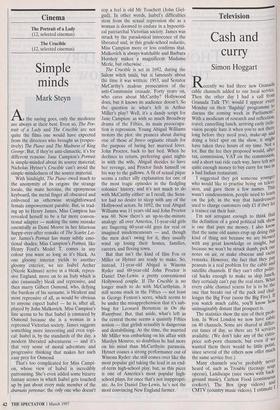Cinema
The Crucible (12, selected cinemas)
Simple minds
Mark Steyn Athe saying goes, only the mediocre are always at their best. Even so, The Por- trait of a Lady and The Crucible are not quite the films one would have expected from the directors who brought us (respec- tively) The Piano and The Madness of King George. But, if they're anti-climactic, it's for different reasons: Jane Campion's Portrait is simple-minded about its source material; Nicholas Hytner's Crucible can't avoid the simple-mindedness of the source material.
With hindsight, The Piano owed much to the anonymity of its origins: the strange locale, the mute heroine, the eponymous keyboard, the metal finger all obscured and enlivened an otherwise straightforward female empowerment parable. But, in trad- ing up to Henry James, Miss Campion has revealed herself to be a far more conven- tional adapter — making the same mistake essentially as Demi Moore in her hilarious happy-ever-after remake of The Scarlet Let- ter. James's Portrait has many subtle emo- tional shades; Miss Campion's Portrait, like Henry Ford's Model T, comes in any colour you want so long as it's black. As one gloomy interior yields to another gloomy exterior, we see Isabel Archer (Nicole Kidman) arrive in a bleak, repres- sive England, move on to an Italy which is also (unusually) bleak and repressive, and then marry Gilbert Osmond, who, defying the burdens of his surname, is bleakest and most repressive of all, as would be obvious to anyone expect Isabel — he is, after all, played by John Malkovich. Miss Campion's line seems to be that Isabel is ensnared by Osmond because she is a woman in a repressed Victorian society. James suggests something more interesting and even topi- cal: Isabel is, by the standards of the day, a modern liberated adventuress — and it's that very sense of moral adventure and progressive thinking that makes her such easy prey for Osmond.
That's too complicated for Miss Campi- on, whose view of Isabel is incredibly patronising. She's even added some bizarre fantasy scenes in which Isabel gets touched up by just about every male member of the dramatis personae; the only one who doesn't cop a feel is old Mr Touchett (John Giel- gud). In other words, Isabel's difficulties stem from the sexual repression she as a woman is doomed to endure in a hypocriti- cal patriarchal Victorian society. James was struck by the paradoxical innocence of the liberated and, in this grade-school reductio, Miss Campion more or less confirms that. Malkovich is always watchable and Barbara Hershey makes a magnificent Madame Merle, but otherwise . . .
The Crucible is set in 1692, during the Salem witch trials, but is famously about the time it was written: 1953, and Senator McCarthy's zealous prosecution of the anti-Communist crusade. Forty years on, who cares about McCarthy? Hollywood does, but it knows its audience doesn't. So the question is: what's left in Arthur Miller's play? Well, it's a dandy script for Jane Campion: as with so much Broadway drama of the Fifties, its main preoccupa- tion is repression. Young Abigail Williams motors the plot: she prances about during one of those al fresco orgiastic rituals for the purpose of luring her married lover, John Proctor, back to her bed. When he declines to return, preferring quiet nights in with the wife, Abigail decides to have her revenge, and Proctor finds himself on his way to the gallows. A fit of sexual pique seems a rather silly explanation for one of the most tragic episodes in the fledgling colonies' history, and it's not much to do with McCarthy either: as I recall, the Sena- tor had no desire to sleep with any of the Hollywood actors. In 1692, the real Abigail Williams was 11 years old and John Proctor was 60. Now there's an up-to-the-minute analogy: all over America, 11-year-old girls are fingering 60-year-old guys for real or imagined misdemeanours — and, though the men don't swing for it, they usually wind up losing their homes, families, careers, and fleeing town.
But that isn't the kind of film Fox or Miller or Hytner are ready to make. So, instead, 11-year-old Abigail is Winona Ryder and 60-year-old John Proctor is Daniel Day-Lewis: a pretty conventional Hollywood couple. If The Crucible is no longer much to do with McCarthyism, it still seems stuck in the Fifties — not least in George Fenton's score, which seems to be under the misapprehension that it's sub- bing for Leonard Bernstein in On the Waterfront. But, that aside, what's left as the central theme seems a quaintly Fifties notion — that girlish sexuality is dangerous and destabilising. At the time, the married Mr Miller was embarking on his affair with Marilyn Monroe, so doubtless he had more on his mind than McCarthyite paranoia. Hytner coaxes a strong performance out of Winona Ryder: she still comes over like the most popular girl taking the lead in an end- of-term high-school play, but, as this piece is one of America's most popular high- school plays, for once that's not inappropri- ate. As for Daniel Day-Lewis, he's not the most convincing New England farmer.


























































 Previous page
Previous page